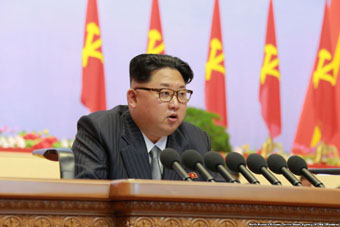
Image courtesy of VOA
North Korea Calls U.S. Sanctions
Act of War
| published July 7, 2016 |
By Keith H. Roberts, Thursday Review contributor
It’s not the first time officials in the isolated country has called something an act of war, but this time the saber rattling is louder than usual. And more personal.
North Korean leader Kim Jong Un says that the recent decision by the United States to impose sanctions against at least ten top North Korean individuals, as well as against many of the country’s financial operations, is “a declaration of war.”
Among those for whom sanctions have been placed—based on recommendations by the U.S. Treasury Department and the U.S. Department of State—is none other than Kim Jong Un. According to a statement by Adam Szubin, Acting Undersecretary for Terrorism and Financial Intelligence, Kim’s personal leadership over a regime of unparalleled levels of human rights abuses and extremist forms of punishment.
“Under Kim Jong Un,” the statement reads, “North Korea continues to inflict intolerable cruelty and hardship on millions of its own people, including extrajudicial killings, forced labor, and torture.”
The U.S. statement also elucidates other human rights abuses routine inside the isolated nation, including multiple generations of families consigned to horrific slave labor camps, specialized torture centers for people who offend leadership, and millions of people deliberately cut off from many basic necessities such as adequate food, shelter and electricity.
The American statement calls North Korean leadership a den of “notorious human rights abuses,” and says that the U.S. government will use all its resources and power to divert or interdict in the financial assets of top North Korean leaders and at least five top Pyongyang government departments, especially those assets lodged in the United States or in banks within the borders of cooperative U.S. allies.
The fact that the American statement names the North Korean leader personally will likely cause a prolonged period of outrage on state-run media north of the 38th Parallel. That heightened level of trash talk, experts predict, may include weeks of threats of war coupled with troop movements, rocket and missile tests, and a variety of provocative actions along the edge of the demilitarized zone which separates North Korea from South Korea.
Tensions along both sides of that heavily militarized corridor have remained relatively high for many years, but within the last two years incidents of provocation and outbursts of rogue violence have raised fears of an outburst of military hostilities. North Korea has also flaunted international law and a variety of sanctions because of its aggressive nuclear program and its frequent tests of weapons, such as missiles and rockets fired from ground-based systems and from submarines.
It is not unusual for state run media in Pyongyang to denounce its adversaries in the most caustic of terms, while also threatening military retaliation.
The Treasury Department’s statement pulled no punches in its criticism of the regime in North Korea.
“The Ministry of State Security engages in torture and inhumane treatment of detainees during interrogation and in detention centers,” the statement reads. “This inhumane treatment includes beatings, forced starvation, sexual assault, forced abortions, and infanticide.”
The report also cited North Korea’s extensive prison camp system in which those accused of political and moral offenses are held for decades, along with members of their families, sometimes for generations.
Though it has called the Treasury Department’s report an act of war, North Korean media has not said what form—if any—of military action the country plans to take in response.
Related Thursday Review articles:
South Korea May Get Advanced Missile System; R. Alan Clanton; Thursday Review; February 13, 2016.
North Korea Says Loudspeakers Are An Act of War; Thursday Review staff; Thursday Review; January 10, 2016.
